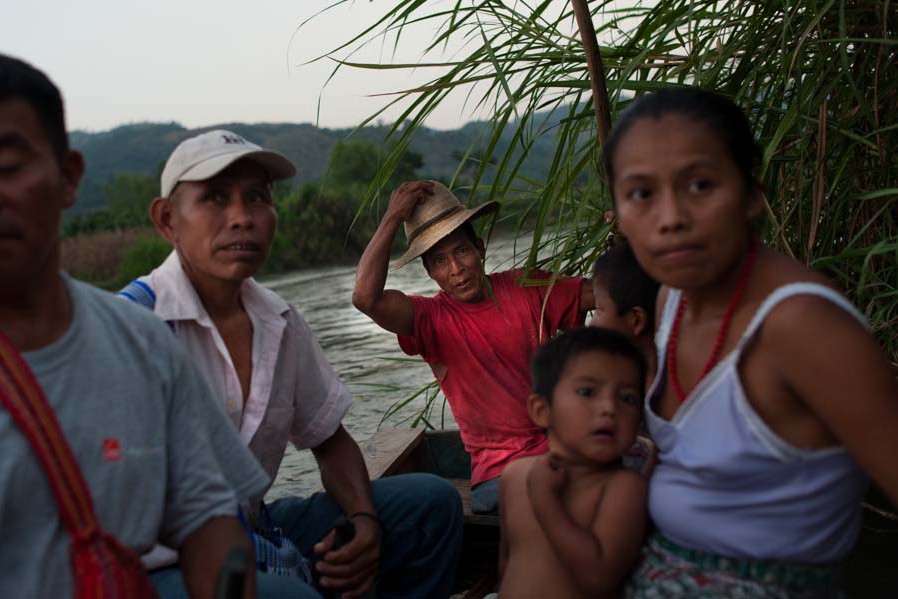 Crossing Polochic river. In March 2011, 14 communities were evicted forcibly and violently from Polochic Valley to make way monocultures of sugarcane and African palm. After two years, about 800 Mayan Q'eqchi's families are landless to live and work. Now each family survives on $ 3-4 a day earned by women especially with small odd jobs. The men are unemployed.
Crossing Polochic river. In March 2011, 14 communities were evicted forcibly and violently from Polochic Valley to make way monocultures of sugarcane and African palm. After two years, about 800 Mayan Q'eqchi's families are landless to live and work. Now each family survives on $ 3-4 a day earned by women especially with small odd jobs. The men are unemployed.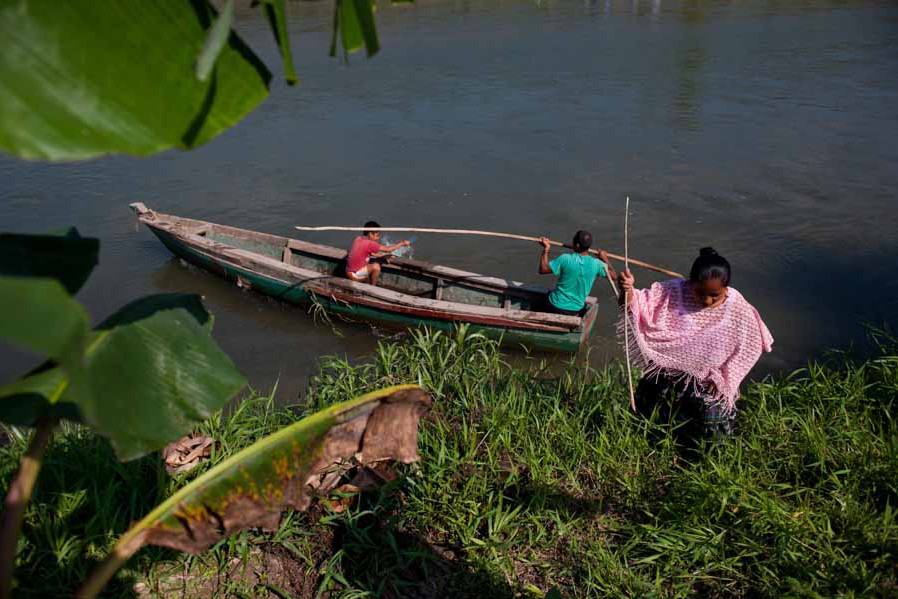 Crossing Polochic river. In March 2011, 14 communities were evicted forcibly and violently from Polochic Valley to make way monocultures of sugarcane and African palm. After two years, about 800 Mayan Q'eqchi's families are landless to live and work. Now each family survives on $ 3-4 a day earned by women especially with small odd jobs. The men are unemployed.
Crossing Polochic river. In March 2011, 14 communities were evicted forcibly and violently from Polochic Valley to make way monocultures of sugarcane and African palm. After two years, about 800 Mayan Q'eqchi's families are landless to live and work. Now each family survives on $ 3-4 a day earned by women especially with small odd jobs. The men are unemployed.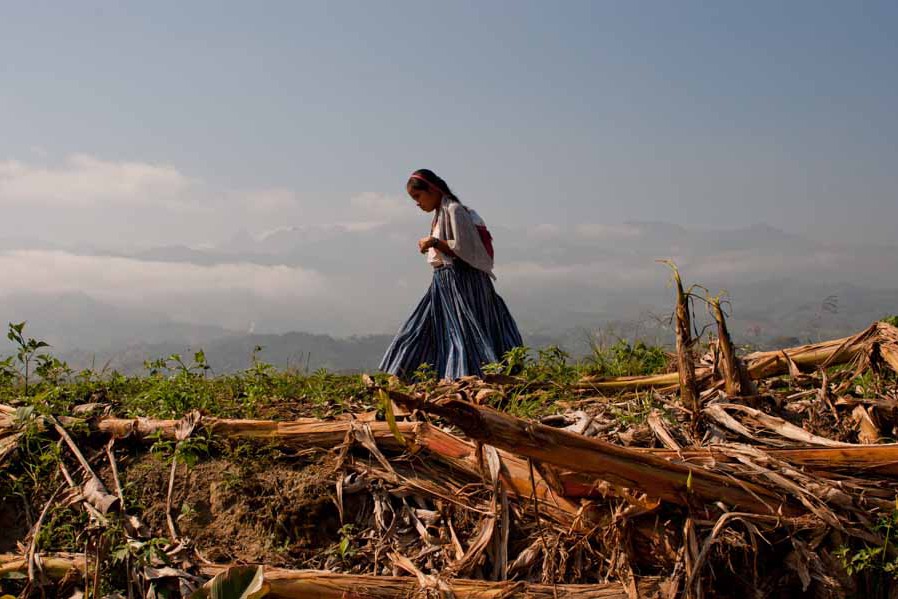 A young girl member of Inup-Aguacaliente community walks in the middle of land where was evicted. In March 2011, 14 communities were evicted forcibly and violently from Polochic Valley to make way monocultures of sugarcane and African palm. After two years, about 800 Mayan Q'eqchi's families are landless to live and work. Now each family survives on $ 3-4 a day earned by women especially with small odd jobs. The men are unemployed.
A young girl member of Inup-Aguacaliente community walks in the middle of land where was evicted. In March 2011, 14 communities were evicted forcibly and violently from Polochic Valley to make way monocultures of sugarcane and African palm. After two years, about 800 Mayan Q'eqchi's families are landless to live and work. Now each family survives on $ 3-4 a day earned by women especially with small odd jobs. The men are unemployed.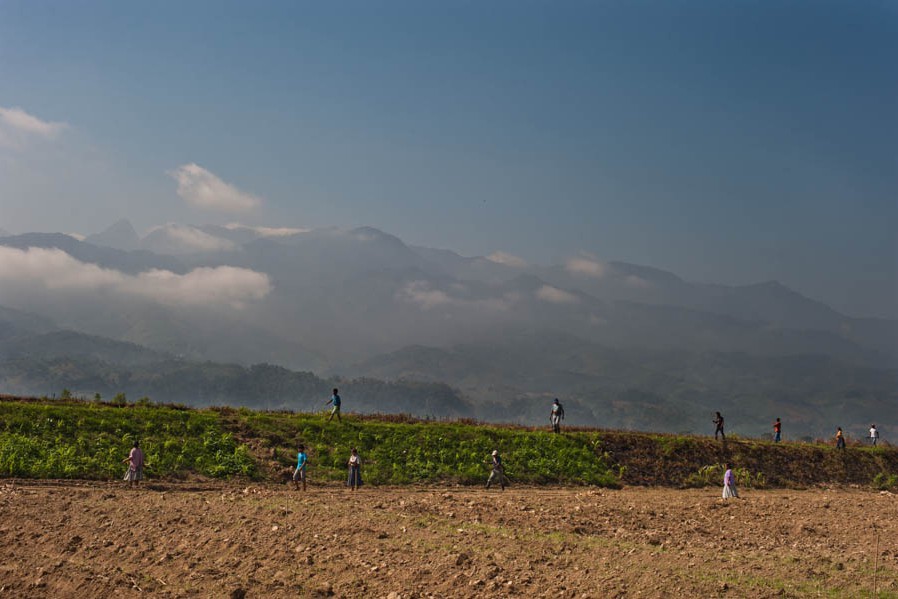 Members of Inup-Aguacaliente community walk in the middle of land where were evicted. In March 2011, 14 communities were evicted forcibly and violently from Polochic Valley to make way monocultures of sugarcane and African palm. After two years, about 800 Mayan Q'eqchi's families are landless to live and work. Now each family survives on $ 3-4 a day earned by women especially with small odd jobs. The men are unemployed.
Members of Inup-Aguacaliente community walk in the middle of land where were evicted. In March 2011, 14 communities were evicted forcibly and violently from Polochic Valley to make way monocultures of sugarcane and African palm. After two years, about 800 Mayan Q'eqchi's families are landless to live and work. Now each family survives on $ 3-4 a day earned by women especially with small odd jobs. The men are unemployed.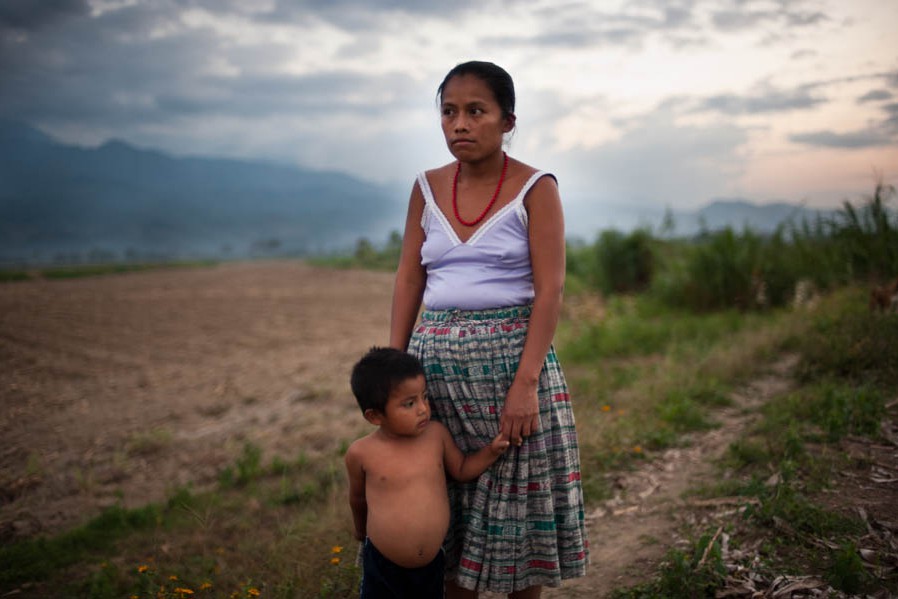 Members of Inup-Aguacaliente community stay in the middle of land where were evicted. In March 2011, 14 communities were evicted forcibly and violently from Polochic Valley to make way monocultures of sugarcane and African palm. After two years, about 800 Mayan Q'eqchi's families are landless to live and work. Now each family survives on $ 3-4 a day earned by women especially with small odd jobs. The men are unemployed.
Members of Inup-Aguacaliente community stay in the middle of land where were evicted. In March 2011, 14 communities were evicted forcibly and violently from Polochic Valley to make way monocultures of sugarcane and African palm. After two years, about 800 Mayan Q'eqchi's families are landless to live and work. Now each family survives on $ 3-4 a day earned by women especially with small odd jobs. The men are unemployed.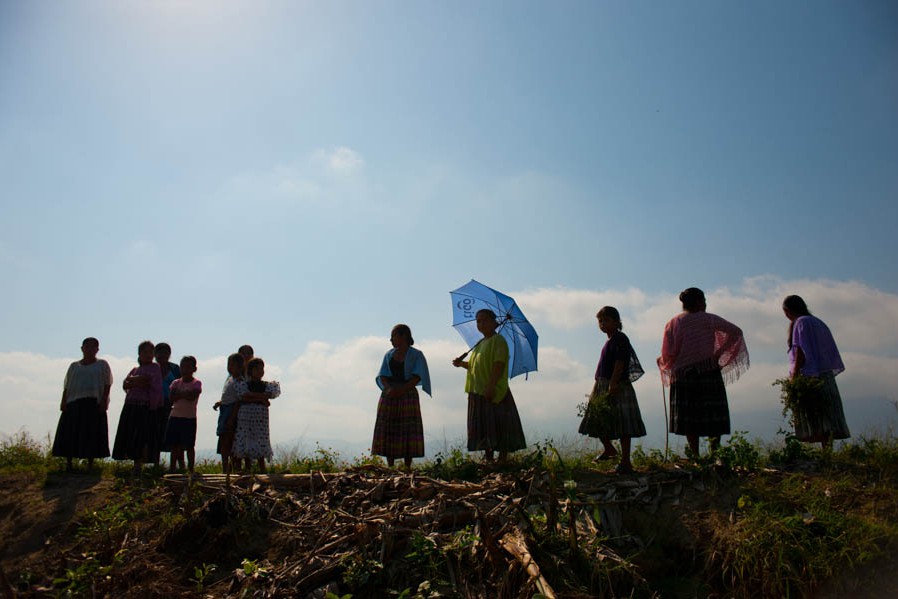 Women members of Inup-Aguacaliente community stay in the middle of land where were evicted. In March 2011, 14 communities were evicted forcibly and violently from Polochic Valley to make way monocultures of sugarcane and African palm. After two years, about 800 Mayan Q'eqchi's families are landless to live and work. Now each family survives on $ 3-4 a day earned by women especially with small odd jobs. The men are unemployed.
Women members of Inup-Aguacaliente community stay in the middle of land where were evicted. In March 2011, 14 communities were evicted forcibly and violently from Polochic Valley to make way monocultures of sugarcane and African palm. After two years, about 800 Mayan Q'eqchi's families are landless to live and work. Now each family survives on $ 3-4 a day earned by women especially with small odd jobs. The men are unemployed.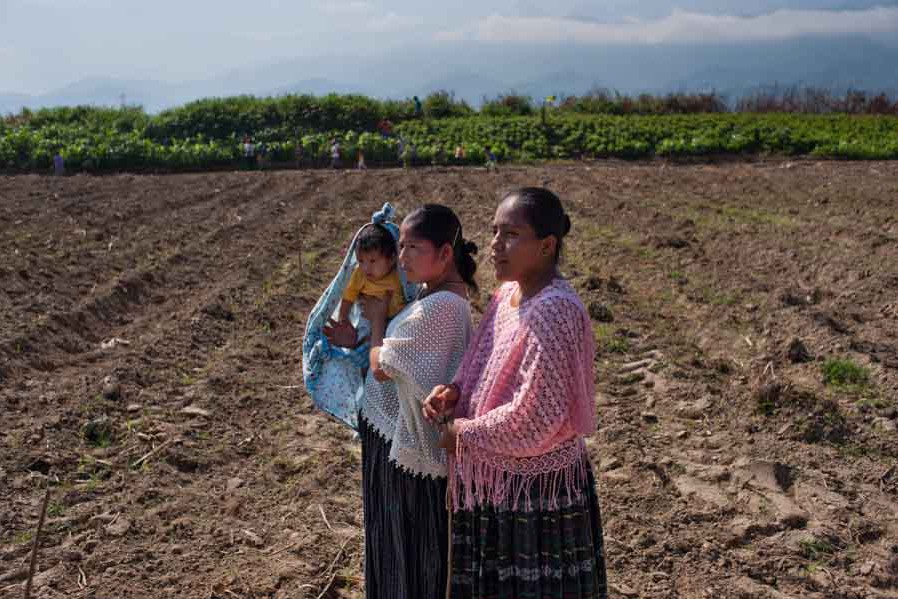 Members of Inup-Aguacaliente community stay in the middle of land where were evicted. In March 2011, 14 communities were evicted forcibly and violently from Polochic Valley to make way monocultures of sugarcane and African palm. After two years, about 800 Mayan Q'eqchi's families are landless to live and work. Now each family survives on $ 3-4 a day earned by women especially with small odd jobs. The men are unemployed.
Members of Inup-Aguacaliente community stay in the middle of land where were evicted. In March 2011, 14 communities were evicted forcibly and violently from Polochic Valley to make way monocultures of sugarcane and African palm. After two years, about 800 Mayan Q'eqchi's families are landless to live and work. Now each family survives on $ 3-4 a day earned by women especially with small odd jobs. The men are unemployed.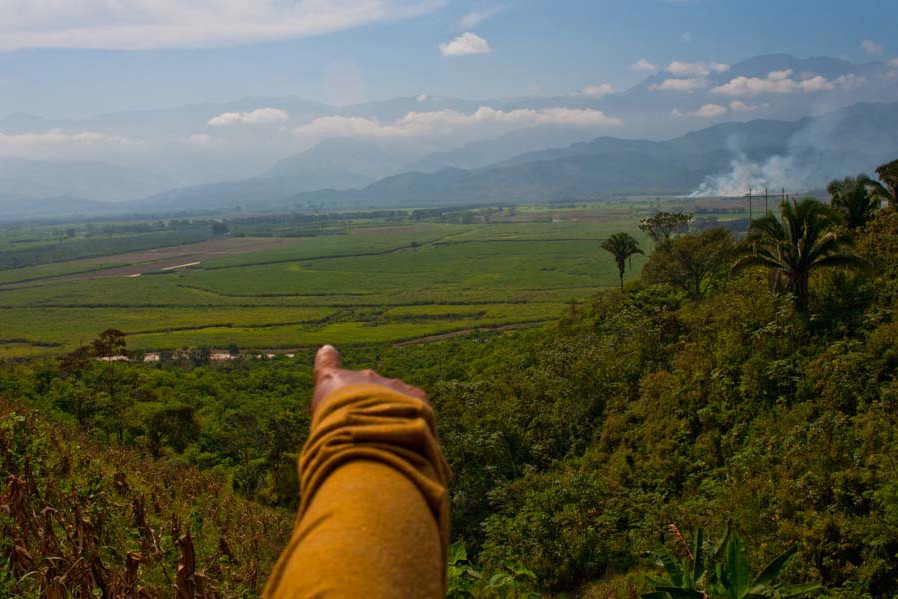 A member of Kquinick community points out where they lived before be evicted. In March 2011, 14 communities were evicted forcibly and violently from Polochic Valley to make way monocultures of sugarcane and African palm. After two years, about 800 Mayan Q'eqchi's families are landless to live and work. Now each family survives on $ 3-4 a day earned by women especially with small odd jobs. The men are unemployed.
A member of Kquinick community points out where they lived before be evicted. In March 2011, 14 communities were evicted forcibly and violently from Polochic Valley to make way monocultures of sugarcane and African palm. After two years, about 800 Mayan Q'eqchi's families are landless to live and work. Now each family survives on $ 3-4 a day earned by women especially with small odd jobs. The men are unemployed.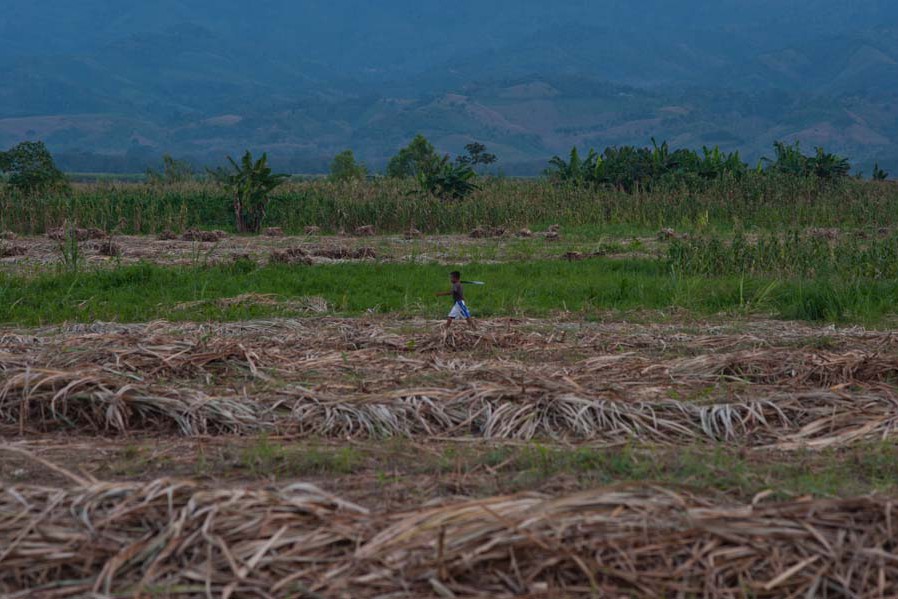 A young member of Inup-Aguacaliente community walks in the middle of land where was evicted. In March 2011, 14 communities were evicted forcibly and violently from Polochic Valley to make way monocultures of sugarcane and African palm. After two years, about 800 Mayan Q'eqchi's families are landless to live and work. Now each family survives on $ 3-4 a day earned by women especially with small odd jobs. The men are unemployed.
A young member of Inup-Aguacaliente community walks in the middle of land where was evicted. In March 2011, 14 communities were evicted forcibly and violently from Polochic Valley to make way monocultures of sugarcane and African palm. After two years, about 800 Mayan Q'eqchi's families are landless to live and work. Now each family survives on $ 3-4 a day earned by women especially with small odd jobs. The men are unemployed.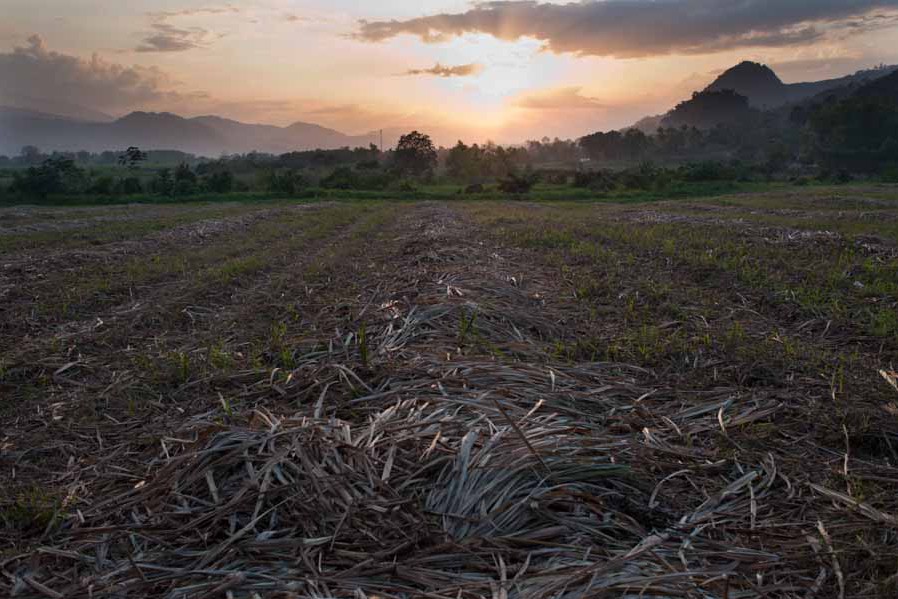 Land evicted. In March 2011, 14 communities were evicted forcibly and violently from Polochic Valley to make way monocultures of sugarcane and African palm. After two years, about 800 Mayan Q'eqchi's families are landless to live and work. Now each family survives on $ 3-4 a day earned by women especially with small odd jobs. The men are unemployed.
Land evicted. In March 2011, 14 communities were evicted forcibly and violently from Polochic Valley to make way monocultures of sugarcane and African palm. After two years, about 800 Mayan Q'eqchi's families are landless to live and work. Now each family survives on $ 3-4 a day earned by women especially with small odd jobs. The men are unemployed.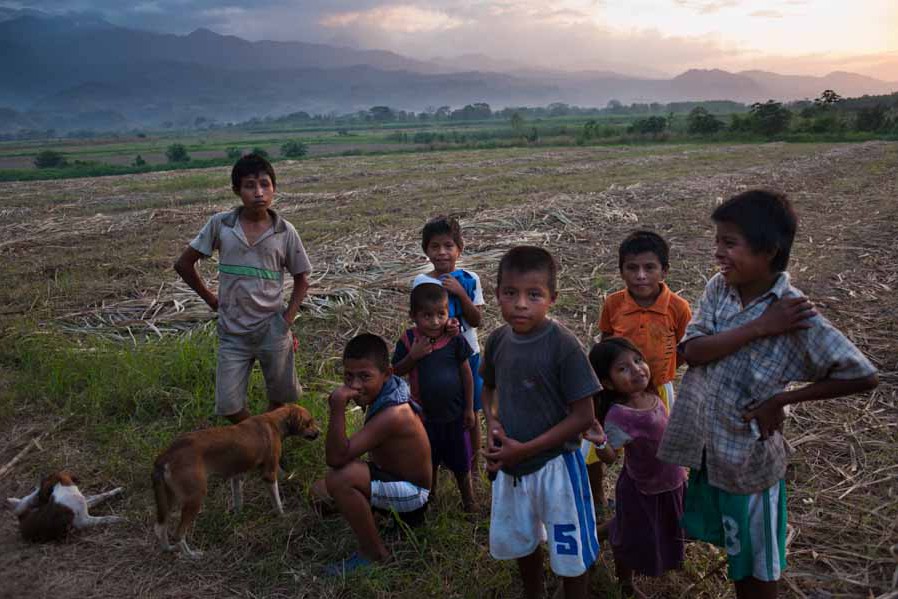 Young boys members of Inup-Aguacaliente community stay in the middle of land where were evicted. In March 2011, 14 communities were evicted forcibly and violently from Polochic Valley to make way monocultures of sugarcane and African palm. After two years, about 800 Mayan Q'eqchi's families are landless to live and work. Now each family survives on $ 3-4 a day earned by women especially with small odd jobs. The men are unemployed.
Young boys members of Inup-Aguacaliente community stay in the middle of land where were evicted. In March 2011, 14 communities were evicted forcibly and violently from Polochic Valley to make way monocultures of sugarcane and African palm. After two years, about 800 Mayan Q'eqchi's families are landless to live and work. Now each family survives on $ 3-4 a day earned by women especially with small odd jobs. The men are unemployed.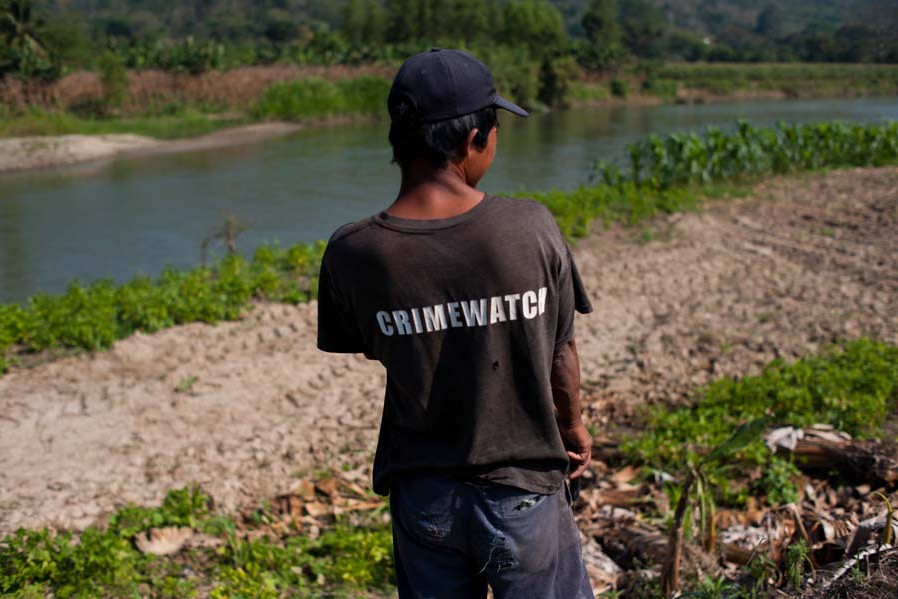 A man member of Inup-Aguacaliente community stays in the middle of land where were evicted. In March 2011, 14 communities were evicted forcibly and violently from Polochic Valley to make way monocultures of sugarcane and African palm. After two years, about 800 Mayan Q'eqchi's families are landless to live and work. Now each family survives on $ 3-4 a day earned by women especially with small odd jobs. The men are unemployed.
A man member of Inup-Aguacaliente community stays in the middle of land where were evicted. In March 2011, 14 communities were evicted forcibly and violently from Polochic Valley to make way monocultures of sugarcane and African palm. After two years, about 800 Mayan Q'eqchi's families are landless to live and work. Now each family survives on $ 3-4 a day earned by women especially with small odd jobs. The men are unemployed.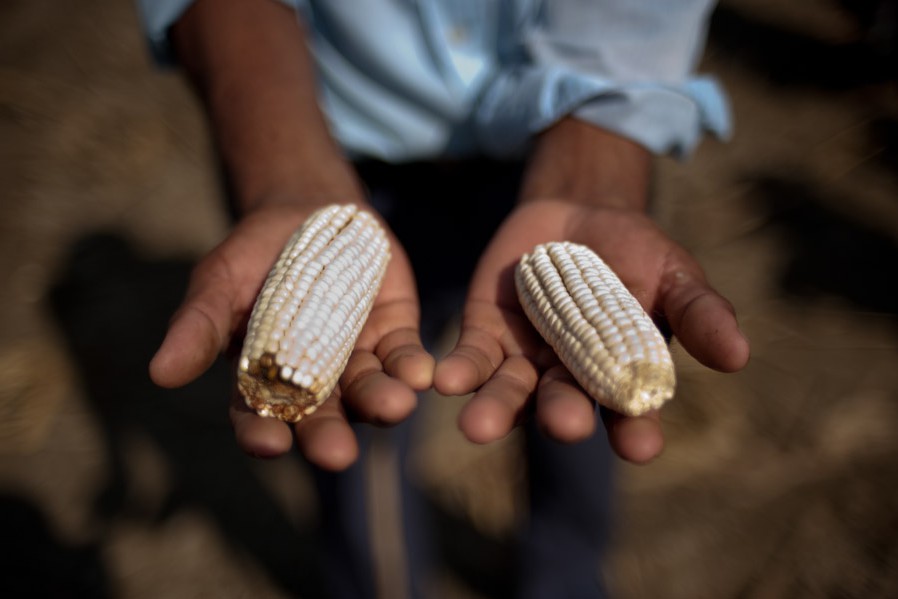 A member of Inup-Aguacaliente community display what remain of their corn plantation. They plant corn in a little parts of the land not occuped for the sugarcane plantation but Chabil Utzaj ("Good Sugarcane" in Q'eqchi Maya language) sugarcane processor owner gives orders to destroy it. In March 2011, 14 communities were evicted forcibly and violently from Polochic Valley to make way monocultures of sugarcane and African palm. After two years, about 800 Mayan Q'eqchi's families are landless to live and work. Now each family survives on $ 3-4 a day earned by women especially with small odd jobs. The men are unemployed.
A member of Inup-Aguacaliente community display what remain of their corn plantation. They plant corn in a little parts of the land not occuped for the sugarcane plantation but Chabil Utzaj ("Good Sugarcane" in Q'eqchi Maya language) sugarcane processor owner gives orders to destroy it. In March 2011, 14 communities were evicted forcibly and violently from Polochic Valley to make way monocultures of sugarcane and African palm. After two years, about 800 Mayan Q'eqchi's families are landless to live and work. Now each family survives on $ 3-4 a day earned by women especially with small odd jobs. The men are unemployed.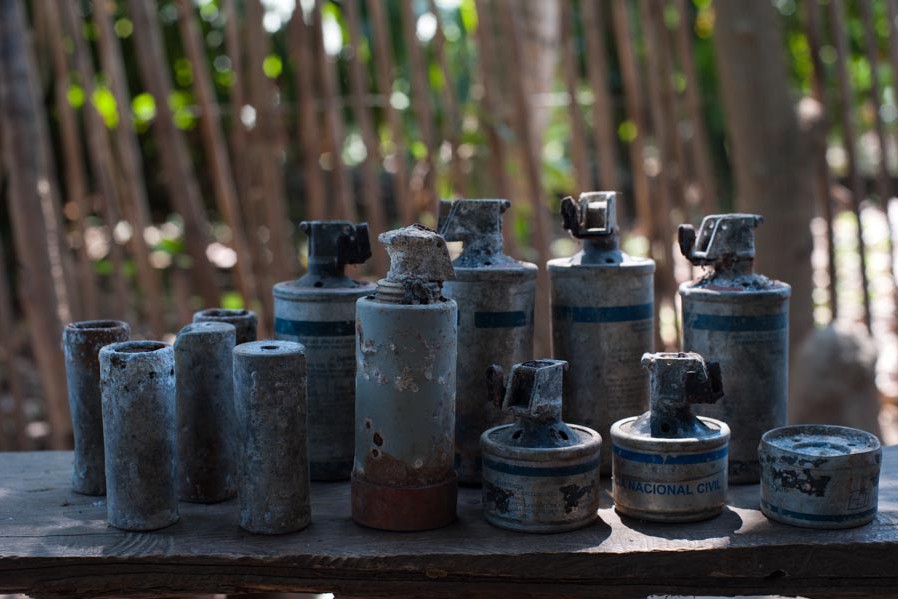 Tear used by state security forces to evict the neighbor Polochic Valley. In March 2011, 14 communities were evicted forcibly and violently from Polochic Valley to make way monocultures of sugarcane and African palm. After two years, about 800 Mayan Q'eqchi's families are landless to live and work. Now each family survives on $ 3-4 a day earned by women especially with small odd jobs. The men are unemployed.
Tear used by state security forces to evict the neighbor Polochic Valley. In March 2011, 14 communities were evicted forcibly and violently from Polochic Valley to make way monocultures of sugarcane and African palm. After two years, about 800 Mayan Q'eqchi's families are landless to live and work. Now each family survives on $ 3-4 a day earned by women especially with small odd jobs. The men are unemployed.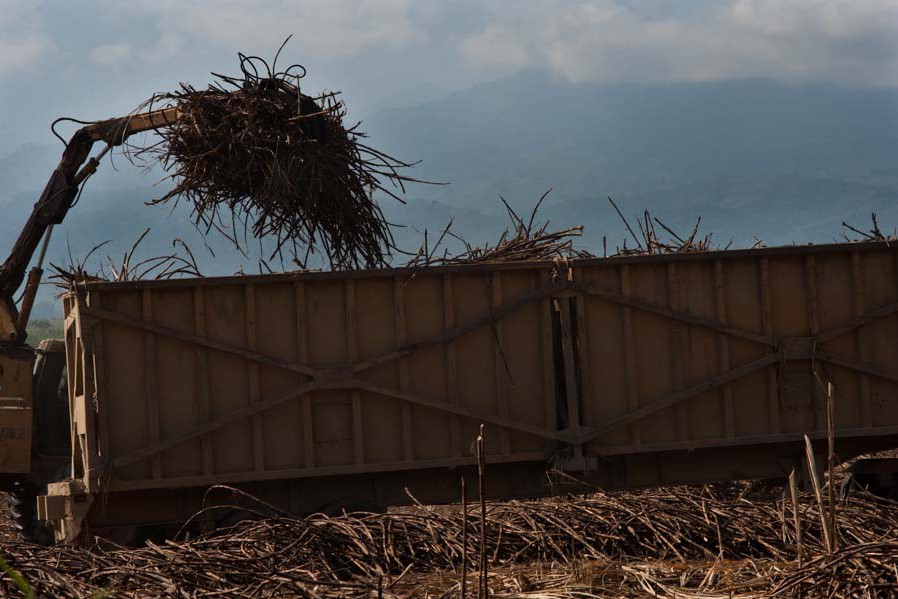 The evict land is worked by Chabil Utzaj ("Good Sugarcane" in Q'eqchi Maya language) sugarcane processor workers contaminating and impoverishing it. In March 2011, 14 communities were evicted forcibly and violently from Polochic Valley to make way monocultures of sugarcane and African palm. After two years, about 800 Mayan Q'eqchi's families are landless to live and work. Now each family survives on $ 3-4 a day earned by women especially with small odd jobs. The men are unemployed.
The evict land is worked by Chabil Utzaj ("Good Sugarcane" in Q'eqchi Maya language) sugarcane processor workers contaminating and impoverishing it. In March 2011, 14 communities were evicted forcibly and violently from Polochic Valley to make way monocultures of sugarcane and African palm. After two years, about 800 Mayan Q'eqchi's families are landless to live and work. Now each family survives on $ 3-4 a day earned by women especially with small odd jobs. The men are unemployed.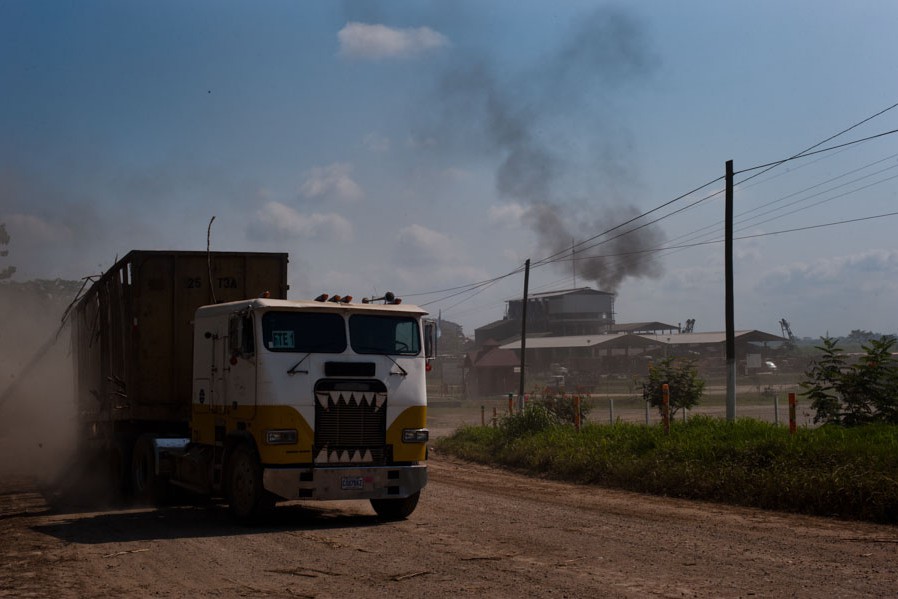 The evict land is worked by Chabil Utzaj ("Good Sugarcane" in Q'eqchi Maya language) sugarcane processor workers contaminating and impoverishing it. In March 2011, 14 communities were evicted forcibly and violently from Polochic Valley to make way monocultures of sugarcane and African palm. After two years, about 800 Mayan Q'eqchi's families are landless to live and work. Now each family survives on $ 3-4 a day earned by women especially with small odd jobs. The men are unemployed.
The evict land is worked by Chabil Utzaj ("Good Sugarcane" in Q'eqchi Maya language) sugarcane processor workers contaminating and impoverishing it. In March 2011, 14 communities were evicted forcibly and violently from Polochic Valley to make way monocultures of sugarcane and African palm. After two years, about 800 Mayan Q'eqchi's families are landless to live and work. Now each family survives on $ 3-4 a day earned by women especially with small odd jobs. The men are unemployed.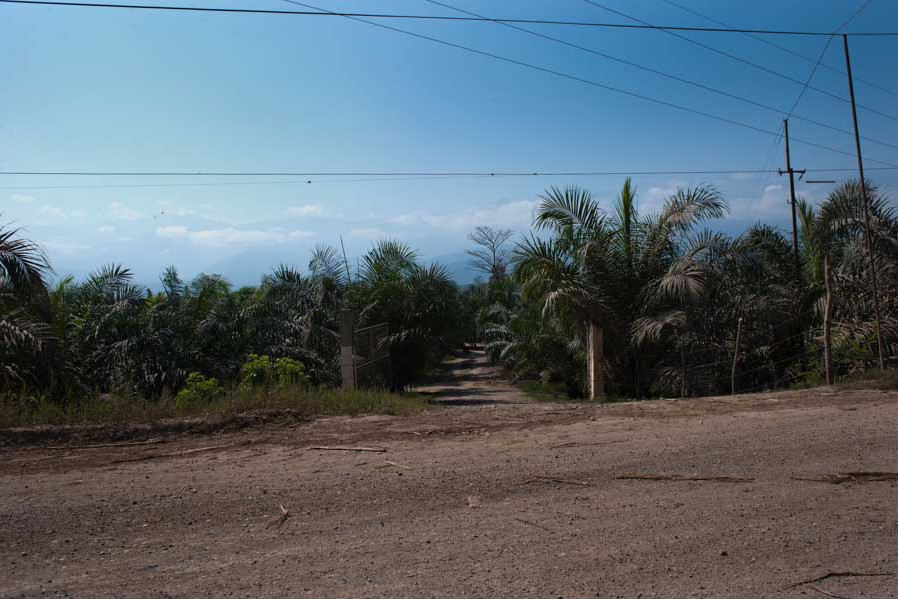 African palm field. In March 2011, 14 communities were evicted forcibly and violently from Polochic Valley to make way monocultures of sugarcane and African palm. After two years, about 800 Mayan Q'eqchi's families are landless to live and work. Now each family survives on $ 3-4 a day earned by women especially with small odd jobs. The men are unemployed.
African palm field. In March 2011, 14 communities were evicted forcibly and violently from Polochic Valley to make way monocultures of sugarcane and African palm. After two years, about 800 Mayan Q'eqchi's families are landless to live and work. Now each family survives on $ 3-4 a day earned by women especially with small odd jobs. The men are unemployed.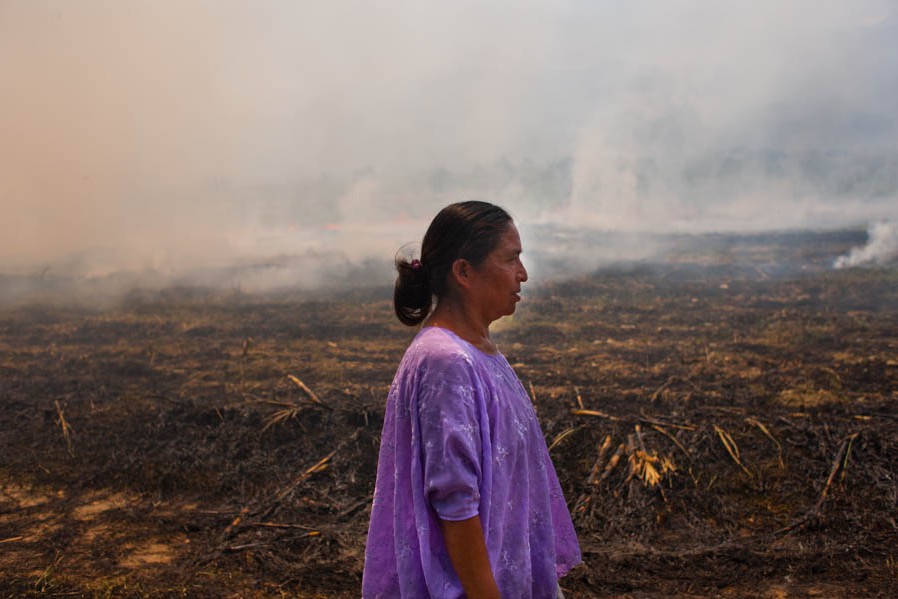 Members of Inup-Aguacaliente community frequently live in the middle of smog produced for the sugarcane processing. In March 2011, 14 communities were evicted forcibly and violently from Polochic Valley to make way monocultures of sugarcane and African palm. After two years, about 800 Mayan Q'eqchi's families are landless to live and work. Now each family survives on $ 3-4 a day earned by women especially with small odd jobs. The men are unemployed.
Members of Inup-Aguacaliente community frequently live in the middle of smog produced for the sugarcane processing. In March 2011, 14 communities were evicted forcibly and violently from Polochic Valley to make way monocultures of sugarcane and African palm. After two years, about 800 Mayan Q'eqchi's families are landless to live and work. Now each family survives on $ 3-4 a day earned by women especially with small odd jobs. The men are unemployed.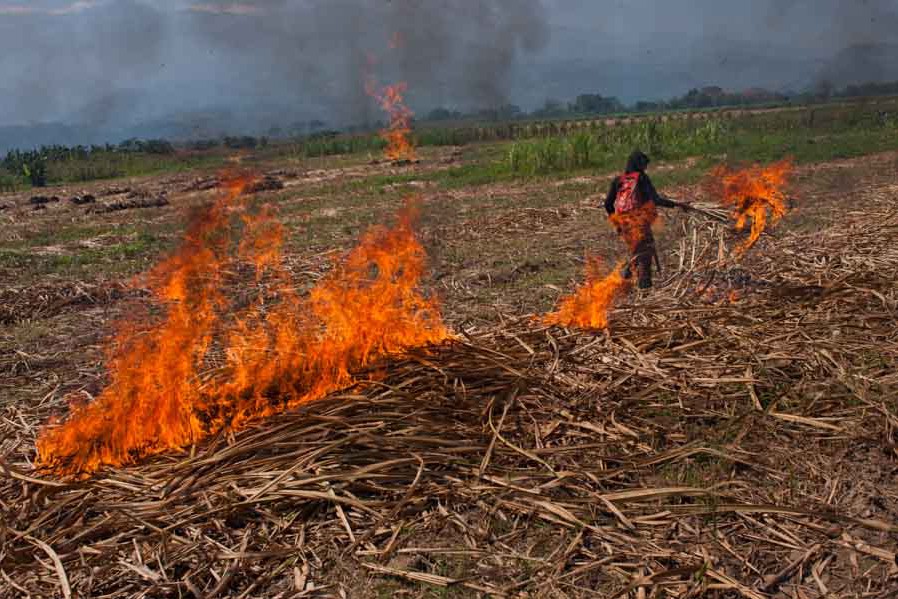 The evict land is worked by Chabil Utzaj ("Good Sugarcane" in Q'eqchi Maya language) sugarcane processor workers contaminating and impoverishing it. In March 2011, 14 communities were evicted forcibly and violently from Polochic Valley to make way monocultures of sugarcane and African palm. After two years, about 800 Mayan Q'eqchi's families are landless to live and work. Now each family survives on $ 3-4 a day earned by women especially with small odd jobs. The men are unemployed.
The evict land is worked by Chabil Utzaj ("Good Sugarcane" in Q'eqchi Maya language) sugarcane processor workers contaminating and impoverishing it. In March 2011, 14 communities were evicted forcibly and violently from Polochic Valley to make way monocultures of sugarcane and African palm. After two years, about 800 Mayan Q'eqchi's families are landless to live and work. Now each family survives on $ 3-4 a day earned by women especially with small odd jobs. The men are unemployed.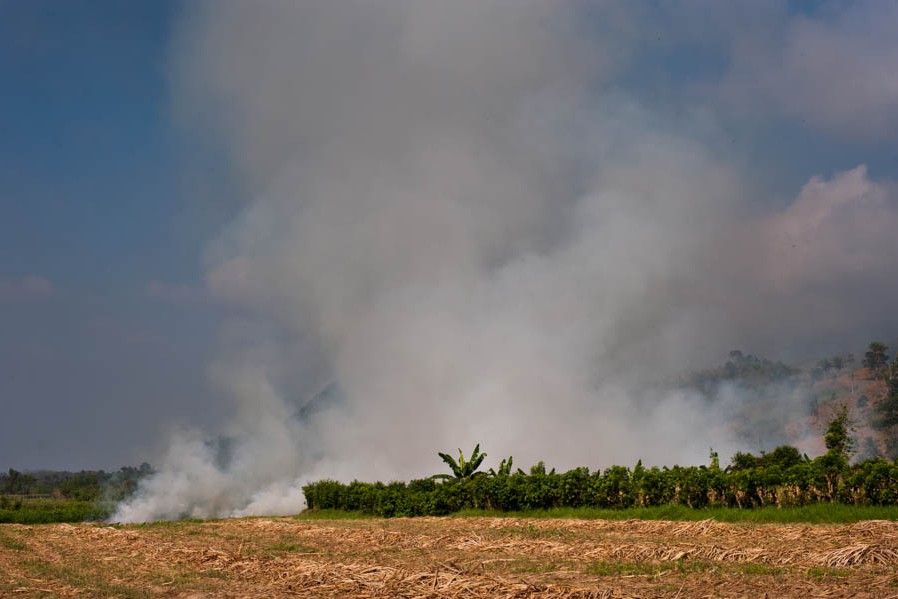 The evict land is worked by Chabil Utzaj ("Good Sugarcane" in Q'eqchi Maya language) sugarcane processor workers contaminating and impoverishing it. In March 2011, 14 communities were evicted forcibly and violently from Polochic Valley to make way monocultures of sugarcane and African palm. After two years, about 800 Mayan Q'eqchi's families are landless to live and work. Now each family survives on $ 3-4 a day earned by women especially with small odd jobs. The men are unemployed.
The evict land is worked by Chabil Utzaj ("Good Sugarcane" in Q'eqchi Maya language) sugarcane processor workers contaminating and impoverishing it. In March 2011, 14 communities were evicted forcibly and violently from Polochic Valley to make way monocultures of sugarcane and African palm. After two years, about 800 Mayan Q'eqchi's families are landless to live and work. Now each family survives on $ 3-4 a day earned by women especially with small odd jobs. The men are unemployed.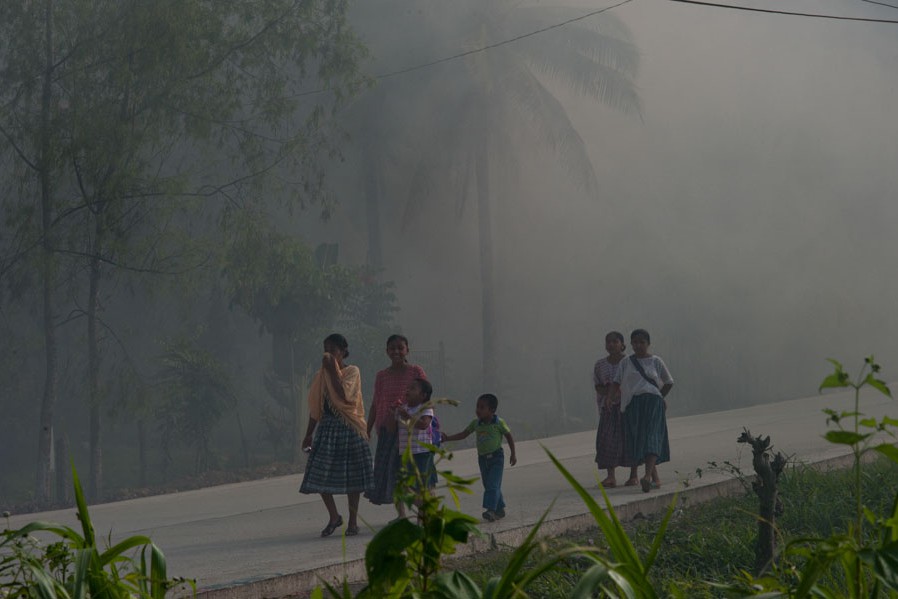 Members of Inup-Aguacaliente community frequently live in the middle of smog produced for the sugarcane processing. In March 2011, 14 communities were evicted forcibly and violently from Polochic Valley to make way monocultures of sugarcane and African palm. After two years, about 800 Mayan Q'eqchi's families are landless to live and work. Now each family survives on $ 3-4 a day earned by women especially with small odd jobs. The men are unemployed.
Members of Inup-Aguacaliente community frequently live in the middle of smog produced for the sugarcane processing. In March 2011, 14 communities were evicted forcibly and violently from Polochic Valley to make way monocultures of sugarcane and African palm. After two years, about 800 Mayan Q'eqchi's families are landless to live and work. Now each family survives on $ 3-4 a day earned by women especially with small odd jobs. The men are unemployed.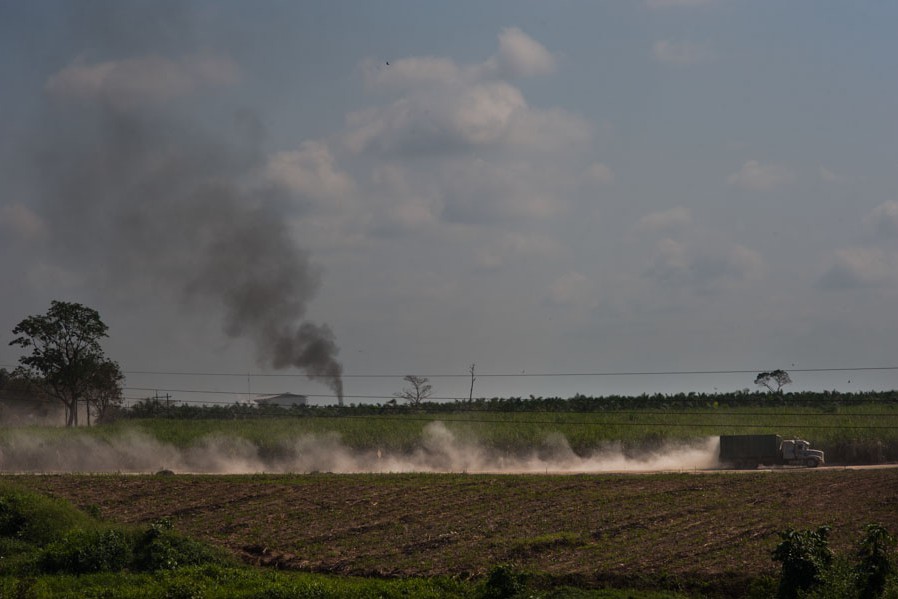 The evict land is worked by Chabil Utzaj ("Good Sugarcane" in Q'eqchi Maya language) sugarcane processor workers contaminating and impoverishing it. In March 2011, 14 communities were evicted forcibly and violently from Polochic Valley to make way monocultures of sugarcane and African palm. After two years, about 800 Mayan Q'eqchi's families are landless to live and work. Now each family survives on $ 3-4 a day earned by women especially with small odd jobs. The men are unemployed.
The evict land is worked by Chabil Utzaj ("Good Sugarcane" in Q'eqchi Maya language) sugarcane processor workers contaminating and impoverishing it. In March 2011, 14 communities were evicted forcibly and violently from Polochic Valley to make way monocultures of sugarcane and African palm. After two years, about 800 Mayan Q'eqchi's families are landless to live and work. Now each family survives on $ 3-4 a day earned by women especially with small odd jobs. The men are unemployed.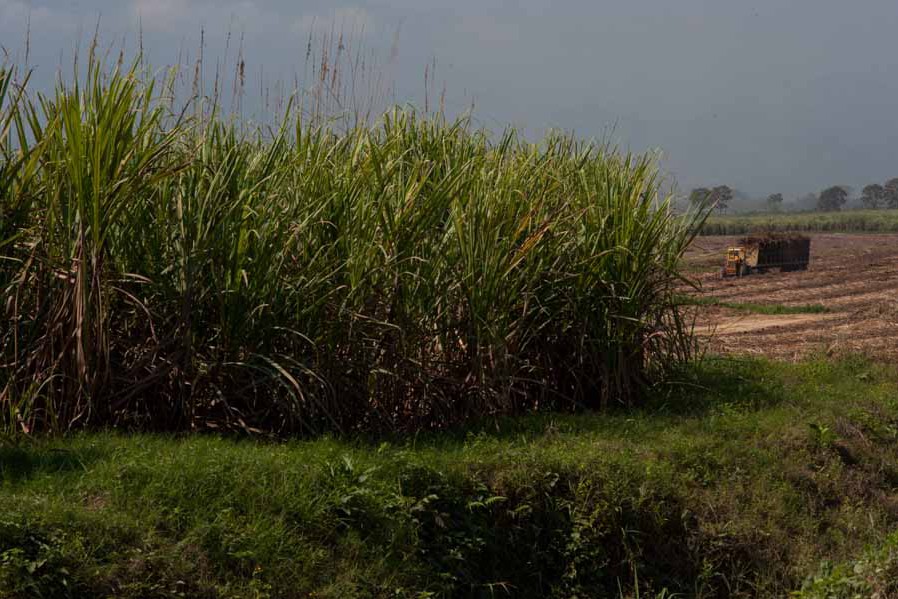 The evict land is worked by Chabil Utzaj ("Good Sugarcane" in Q'eqchi Maya language) sugarcane processor workers contaminating and impoverishing it. In March 2011, 14 communities were evicted forcibly and violently from Polochic Valley to make way monocultures of sugarcane and African palm. After two years, about 800 Mayan Q'eqchi's families are landless to live and work. Now each family survives on $ 3-4 a day earned by women especially with small odd jobs. The men are unemployed.
The evict land is worked by Chabil Utzaj ("Good Sugarcane" in Q'eqchi Maya language) sugarcane processor workers contaminating and impoverishing it. In March 2011, 14 communities were evicted forcibly and violently from Polochic Valley to make way monocultures of sugarcane and African palm. After two years, about 800 Mayan Q'eqchi's families are landless to live and work. Now each family survives on $ 3-4 a day earned by women especially with small odd jobs. The men are unemployed.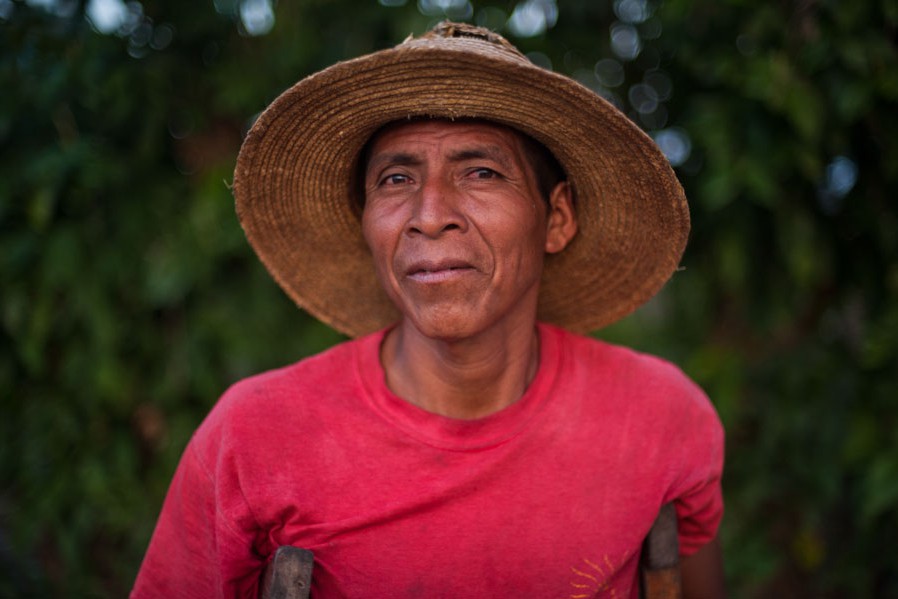 Juan Chocooj, member of Inup-Aguacaliente community. In March 2011, 14 communities were evicted forcibly and violently from Polochic Valley to make way monocultures of sugarcane and African palm. After two years, about 800 Mayan Q'eqchi's families are landless to live and work. Now each family survives on $ 3-4 a day earned by women especially with small odd jobs. The men are unemployed.
Juan Chocooj, member of Inup-Aguacaliente community. In March 2011, 14 communities were evicted forcibly and violently from Polochic Valley to make way monocultures of sugarcane and African palm. After two years, about 800 Mayan Q'eqchi's families are landless to live and work. Now each family survives on $ 3-4 a day earned by women especially with small odd jobs. The men are unemployed.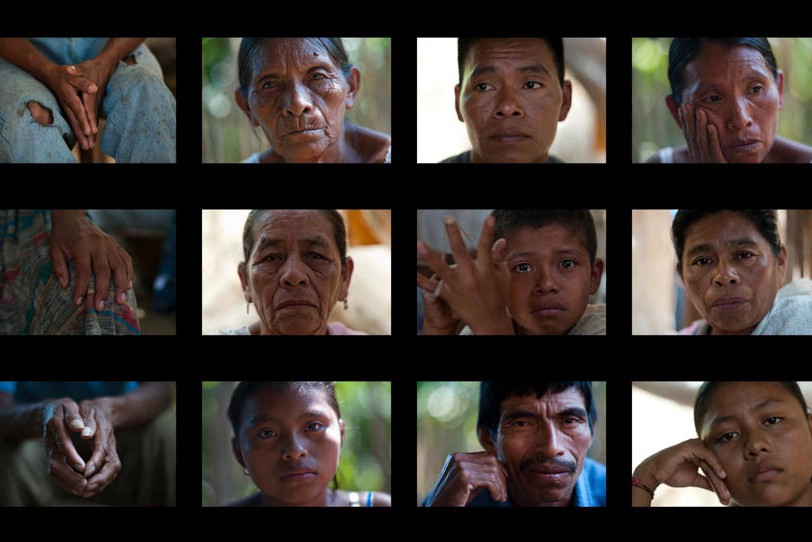 Neighbors of Polochic Valley. In March 2011, 14 communities were evicted forcibly and violently from Polochic Valley to make way monocultures of sugarcane and African palm. After two years, about 800 Mayan Q'eqchi's families are landless to live and work. Now each family survives on $ 3-4 a day earned by women especially with small odd jobs. The men are unemployed.
Neighbors of Polochic Valley. In March 2011, 14 communities were evicted forcibly and violently from Polochic Valley to make way monocultures of sugarcane and African palm. After two years, about 800 Mayan Q'eqchi's families are landless to live and work. Now each family survives on $ 3-4 a day earned by women especially with small odd jobs. The men are unemployed.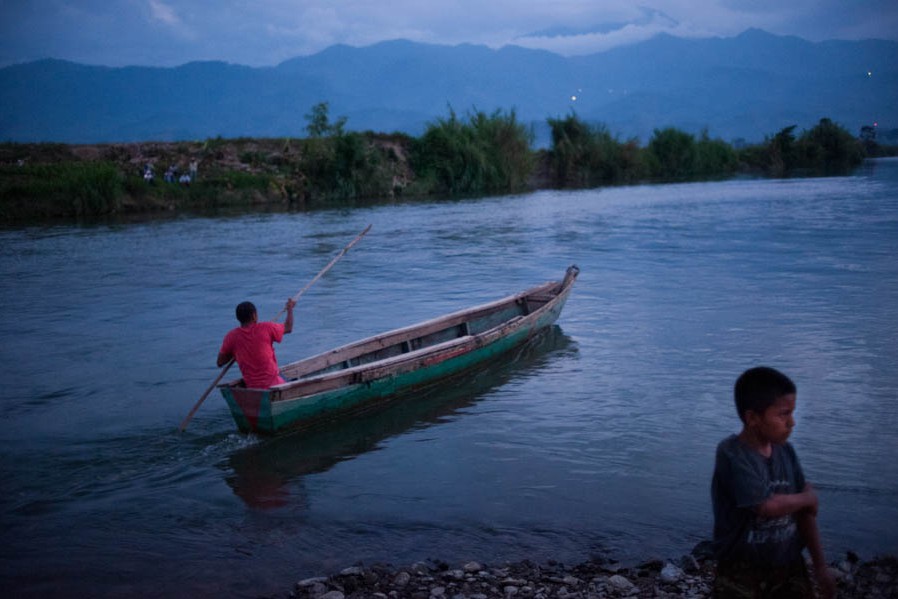 Crossing Polochic river. In March 2011, 14 communities were evicted forcibly and violently from Polochic Valley to make way monocultures of sugarcane and African palm. After two years, about 800 Mayan Q'eqchi's families are landless to live and work. Now each family survives on $ 3-4 a day earned by women especially with small odd jobs. The men are unemployed.
Crossing Polochic river. In March 2011, 14 communities were evicted forcibly and violently from Polochic Valley to make way monocultures of sugarcane and African palm. After two years, about 800 Mayan Q'eqchi's families are landless to live and work. Now each family survives on $ 3-4 a day earned by women especially with small odd jobs. The men are unemployed.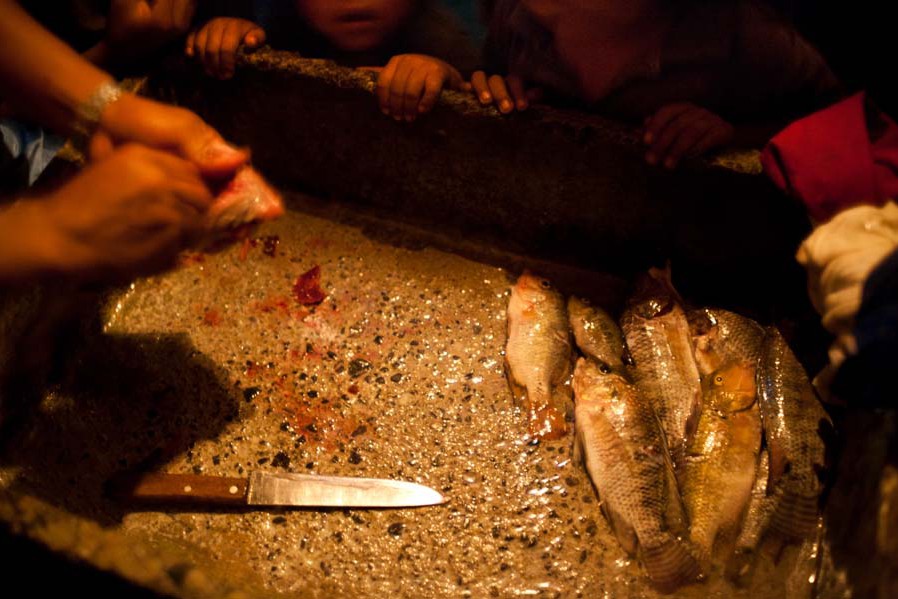 Inup-Aguacaliente's community member clears some of fish. Maybe the unique proteins source for their alimentation. In March 2011, 14 communities were evicted forcibly and violently from Polochic Valley to make way monocultures of sugarcane and African palm. After two years, about 800 Mayan Q'eqchi's families are landless to live and work. Now each family survives on $ 3-4 a day earned by women especially with small odd jobs. The men are unemployed.
Inup-Aguacaliente's community member clears some of fish. Maybe the unique proteins source for their alimentation. In March 2011, 14 communities were evicted forcibly and violently from Polochic Valley to make way monocultures of sugarcane and African palm. After two years, about 800 Mayan Q'eqchi's families are landless to live and work. Now each family survives on $ 3-4 a day earned by women especially with small odd jobs. The men are unemployed.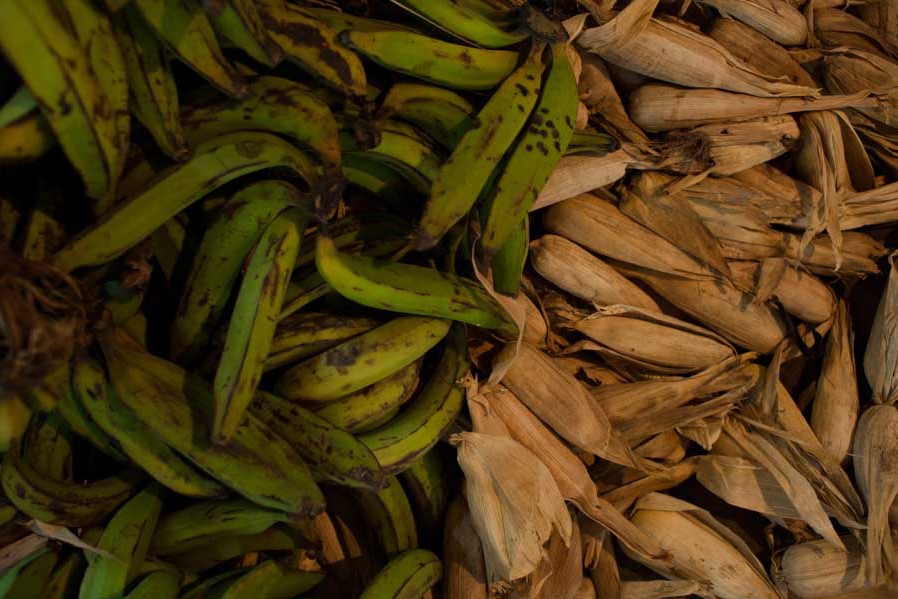 Community members of Inup-Aguacaliente village saved from destruction some of corn and plantains after that Chabil Utzaj ("Good Sugarcane" in Q'eqchi Maya language) sugarcane processor workers did it. In March 2011, 14 communities were evicted forcibly and violently from Polochic Valley to make way monocultures of sugarcane and African palm. After two years, about 800 Mayan Q'eqchi's families are landless to live and work. Now each family survives on $ 3-4 a day earned by women especially with small odd jobs. The men are unemployed.
Community members of Inup-Aguacaliente village saved from destruction some of corn and plantains after that Chabil Utzaj ("Good Sugarcane" in Q'eqchi Maya language) sugarcane processor workers did it. In March 2011, 14 communities were evicted forcibly and violently from Polochic Valley to make way monocultures of sugarcane and African palm. After two years, about 800 Mayan Q'eqchi's families are landless to live and work. Now each family survives on $ 3-4 a day earned by women especially with small odd jobs. The men are unemployed.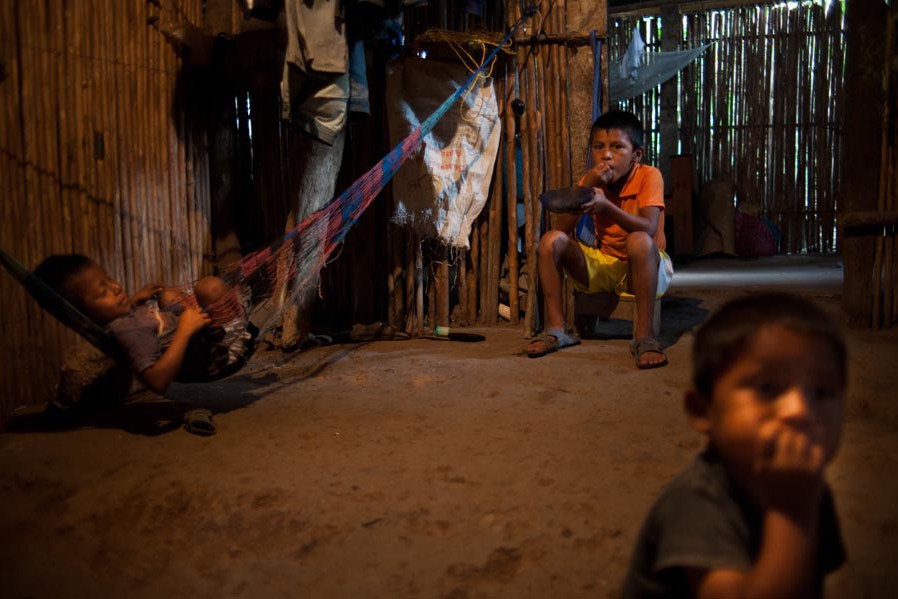 Young boys members of Inup-Aguacaliente community. In March 2011, 14 communities were evicted forcibly and violently from Polochic Valley to make way monocultures of sugarcane and African palm. After two years, about 800 Mayan Q'eqchi's families are landless to live and work. Now each family survives on $ 3-4 a day earned by women especially with small odd jobs. The men are unemployed.
Young boys members of Inup-Aguacaliente community. In March 2011, 14 communities were evicted forcibly and violently from Polochic Valley to make way monocultures of sugarcane and African palm. After two years, about 800 Mayan Q'eqchi's families are landless to live and work. Now each family survives on $ 3-4 a day earned by women especially with small odd jobs. The men are unemployed.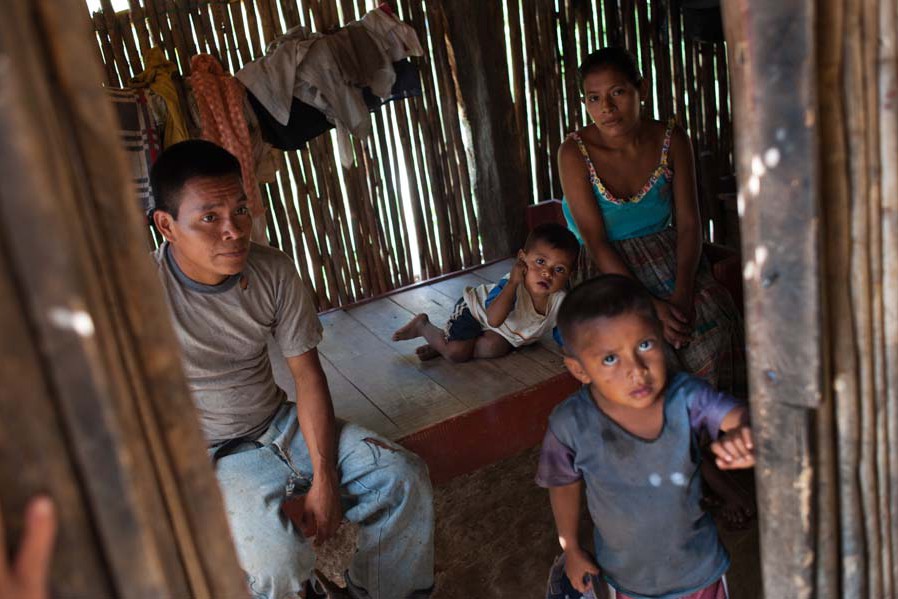 Mario Cucul Cu, 29 and his wife Candelaria Choc Pau, 26 with theirs children in they rented house in the Kquinick community. In March 2011, 14 communities were evicted forcibly and violently from Polochic Valley to make way monocultures of sugarcane and African palm. After two years, about 800 Mayan Q'eqchi's families are landless to live and work. Now each family survives on $ 3-4 a day earned by women especially with small odd jobs. The men are unemployed.
Mario Cucul Cu, 29 and his wife Candelaria Choc Pau, 26 with theirs children in they rented house in the Kquinick community. In March 2011, 14 communities were evicted forcibly and violently from Polochic Valley to make way monocultures of sugarcane and African palm. After two years, about 800 Mayan Q'eqchi's families are landless to live and work. Now each family survives on $ 3-4 a day earned by women especially with small odd jobs. The men are unemployed.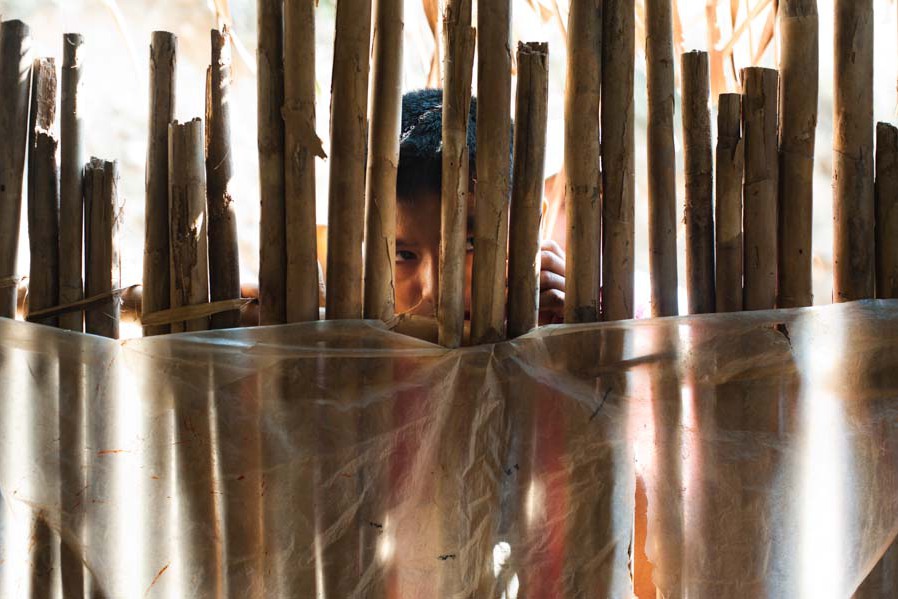 Young boy member of Kquinick community. In March 2011, 14 communities were evicted forcibly and violently from Polochic Valley to make way monocultures of sugarcane and African palm. After two years, about 800 Mayan Q'eqchi's families are landless to live and work. Now each family survives on $ 3-4 a day earned by women especially with small odd jobs. The men are unemployed.
Young boy member of Kquinick community. In March 2011, 14 communities were evicted forcibly and violently from Polochic Valley to make way monocultures of sugarcane and African palm. After two years, about 800 Mayan Q'eqchi's families are landless to live and work. Now each family survives on $ 3-4 a day earned by women especially with small odd jobs. The men are unemployed.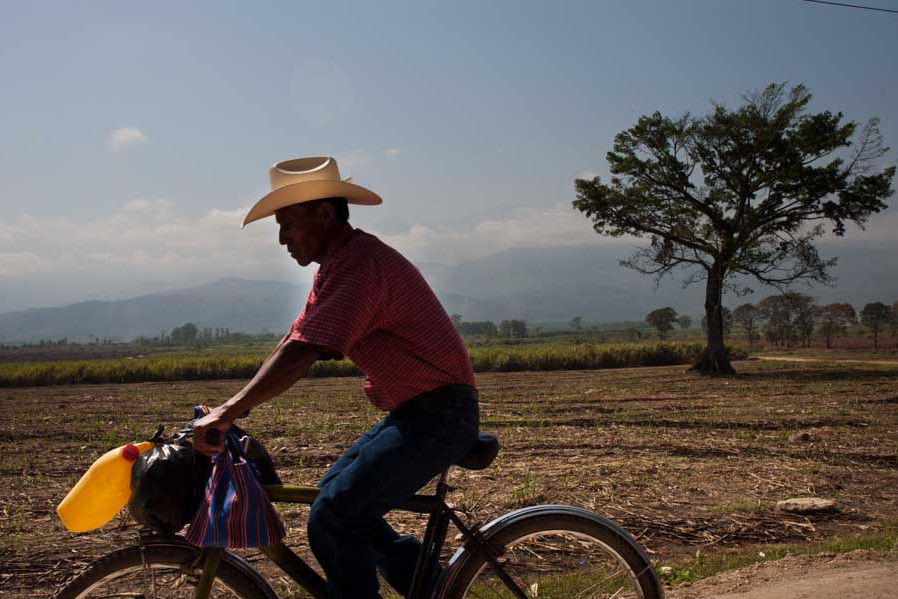 Sugarcane field. In March 2011, 14 communities were evicted forcibly and violently from Polochic Valley to make way monocultures of sugarcane and African palm. After two years, about 800 Mayan Q'eqchi's families are landless to live and work. Now each family survives on $ 3-4 a day earned by women especially with small odd jobs. The men are unemployed.
Sugarcane field. In March 2011, 14 communities were evicted forcibly and violently from Polochic Valley to make way monocultures of sugarcane and African palm. After two years, about 800 Mayan Q'eqchi's families are landless to live and work. Now each family survives on $ 3-4 a day earned by women especially with small odd jobs. The men are unemployed.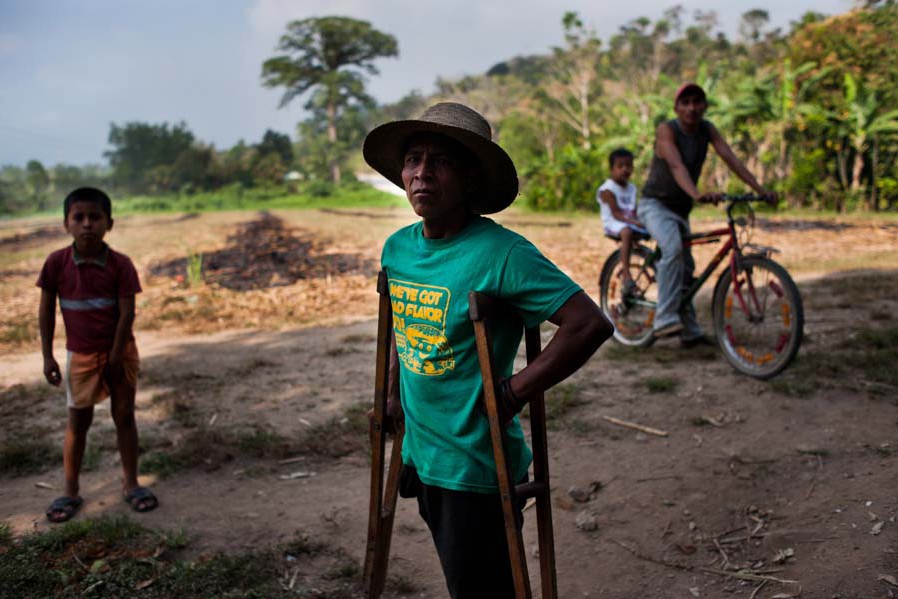 Juan Chocooj (center) and other member of Inup-Aguacaliente community stay in the middle of land where were evicted. In March 2011, 14 communities were evicted forcibly and violently from Polochic Valley to make way monocultures of sugarcane and African palm. After two years, about 800 Mayan Q'eqchi's families are landless to live and work. Now each family survives on $ 3-4 a day earned by women especially with small odd jobs. The men are unemployed.
Juan Chocooj (center) and other member of Inup-Aguacaliente community stay in the middle of land where were evicted. In March 2011, 14 communities were evicted forcibly and violently from Polochic Valley to make way monocultures of sugarcane and African palm. After two years, about 800 Mayan Q'eqchi's families are landless to live and work. Now each family survives on $ 3-4 a day earned by women especially with small odd jobs. The men are unemployed.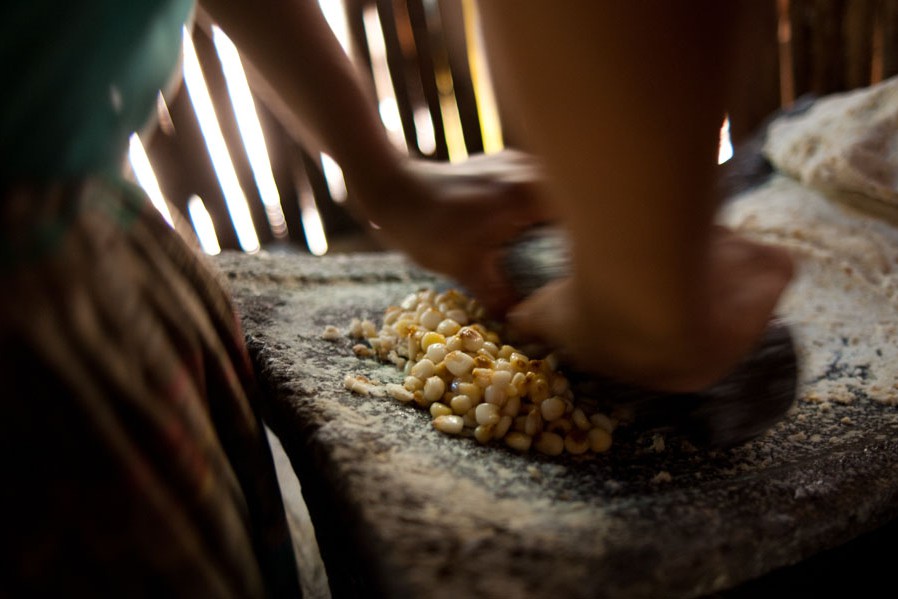 Candelaria Choc Pau, 26, Kquinick community member, grinds corn to make "tortillas". In March 2011, 14 communities were evicted forcibly and violently from Polochic Valley to make way monocultures of sugarcane and African palm. After two years, about 800 Mayan Q'eqchi's families are landless to live and work. Now each family survives on $ 3-4 a day earned by women especially with small odd jobs. The men are unemployed.
Candelaria Choc Pau, 26, Kquinick community member, grinds corn to make "tortillas". In March 2011, 14 communities were evicted forcibly and violently from Polochic Valley to make way monocultures of sugarcane and African palm. After two years, about 800 Mayan Q'eqchi's families are landless to live and work. Now each family survives on $ 3-4 a day earned by women especially with small odd jobs. The men are unemployed.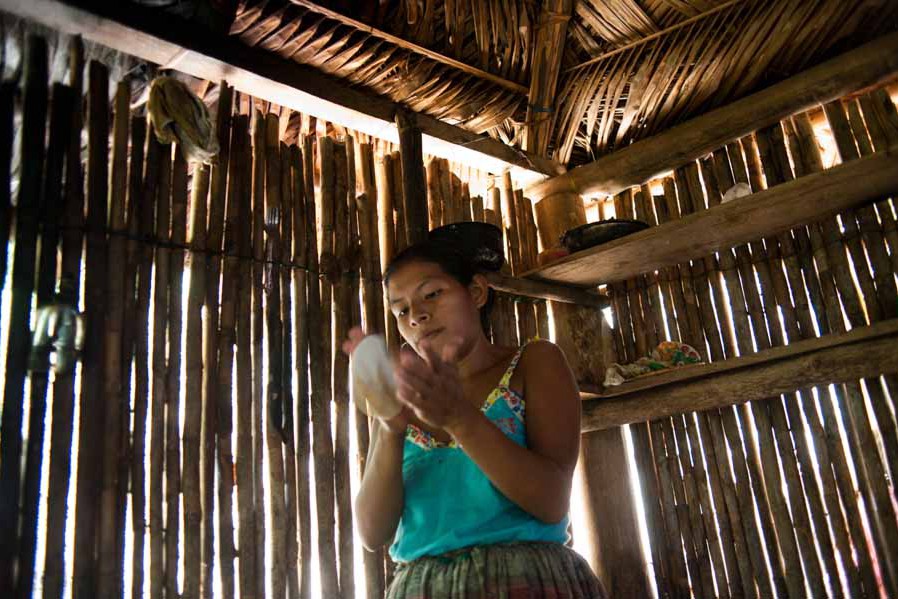 Candelaria Choc Pau, 26, Kquinick community member, makes "tortillas". In March 2011, 14 communities were evicted forcibly and violently from Polochic Valley to make way monocultures of sugarcane and African palm. After two years, about 800 Mayan Q'eqchi's families are landless to live and work. Now each family survives on $ 3-4 a day earned by women especially with small odd jobs. The men are unemployed.
Candelaria Choc Pau, 26, Kquinick community member, makes "tortillas". In March 2011, 14 communities were evicted forcibly and violently from Polochic Valley to make way monocultures of sugarcane and African palm. After two years, about 800 Mayan Q'eqchi's families are landless to live and work. Now each family survives on $ 3-4 a day earned by women especially with small odd jobs. The men are unemployed.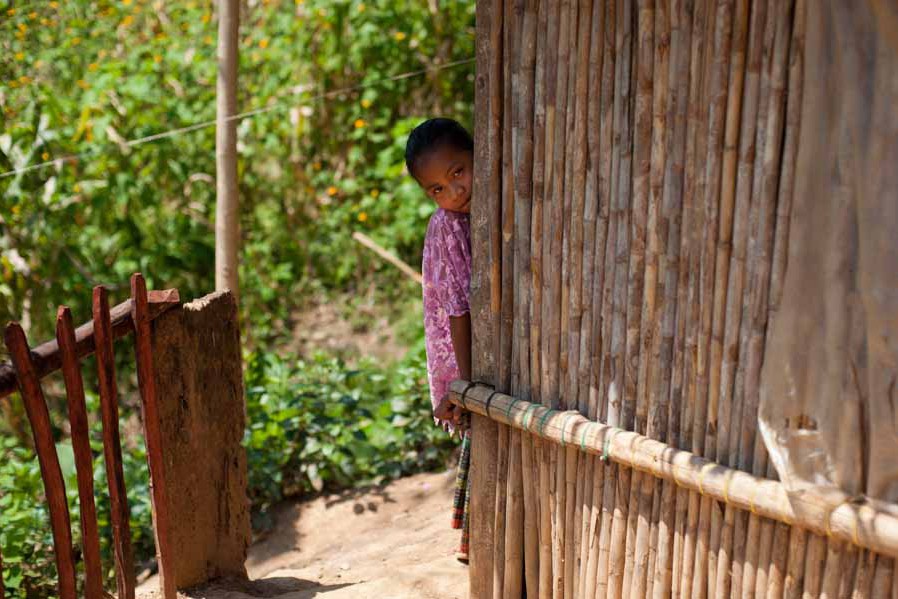 Young girl member of Kquinick community. In March 2011, 14 communities were evicted forcibly and violently from Polochic Valley to make way monocultures of sugarcane and African palm. After two years, about 800 Mayan Q'eqchi's families are landless to live and work. Now each family survives on $ 3-4 a day earned by women especially with small odd jobs. The men are unemployed.
Young girl member of Kquinick community. In March 2011, 14 communities were evicted forcibly and violently from Polochic Valley to make way monocultures of sugarcane and African palm. After two years, about 800 Mayan Q'eqchi's families are landless to live and work. Now each family survives on $ 3-4 a day earned by women especially with small odd jobs. The men are unemployed.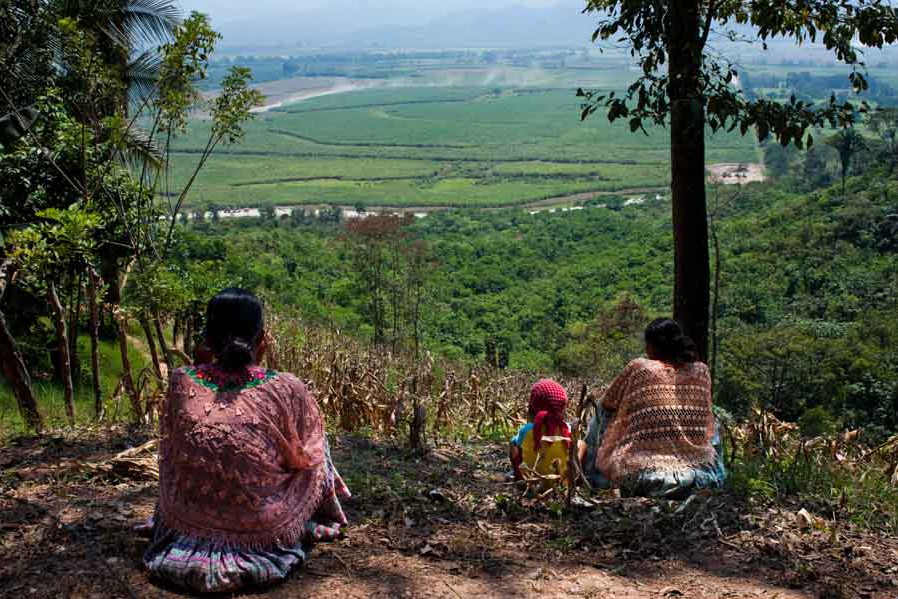 Members of Kquinick community look the land where were evicted. In March 2011, 14 communities were evicted forcibly and violently from Polochic Valley to make way monocultures of sugarcane and African palm. After two years, about 800 Mayan Q'eqchi's families are landless to live and work. Now each family survives on $ 3-4 a day earned by women especially with small odd jobs. The men are unemployed.
Members of Kquinick community look the land where were evicted. In March 2011, 14 communities were evicted forcibly and violently from Polochic Valley to make way monocultures of sugarcane and African palm. After two years, about 800 Mayan Q'eqchi's families are landless to live and work. Now each family survives on $ 3-4 a day earned by women especially with small odd jobs. The men are unemployed.
In March 2011, 14 communities were evicted forcibly and violently from Polochic Valley to make way monocultures of sugarcane and African palm. After two years, about 800 Mayan Q’eqchi’s families are landless to live and work. Now each family survives on $3-4 a day earned by women especially with small odd jobs. The men are unemployed.